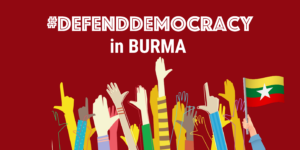WATCH: 365 days under the Myanmar coup
The military junta continues to commit crimes against humanity with impunity. But the Myanmar people’s fight for democracy never stops. #WhatsHappeningInMyanmar pic.twitter.com/mgz81HE2fM
— Fortify Rights (@FortifyRights) February 1, 2022
A year on from the Myanmar military coup, the Assistance Association for Political Prisoners (see below), said in its most recent briefing that it had verified the deaths of at least 1,503 people at the hands of the military as of Monday, adding that the actual number of fatalities is likely to be much higher. The junta has also arbitrarily detained over 11,000 activists, politicians, journalists, and others, it adds.
Members of the international community have responded with shock and concern, offering welcome statements of support for the people and admonitions of the military’s heinous acts. But words are insufficient, adds Zau Maran, a human rights associate at the advocacy organization Fortify Rights. If we, the people of Myanmar, are to succeed in regaining our future, then governments must do their part to strip the military of its access to money, weapons and political legitimacy, and our military leaders must be held accountable for their crimes, says Zau, writing for The Washington Post under a pseudonym for security reasons.
 “Myanmar’s erratic democratic transition has been fraught with challenges,” said a joint statement on the occasion of the coup, signed by the National Endowment for Democracy (NED) and many other signatories. “Yet, democracy still offers the best hope to protect human dignity, provide legitimate governance and advance the freedom of all people,” it added.
“Myanmar’s erratic democratic transition has been fraught with challenges,” said a joint statement on the occasion of the coup, signed by the National Endowment for Democracy (NED) and many other signatories. “Yet, democracy still offers the best hope to protect human dignity, provide legitimate governance and advance the freedom of all people,” it added.
Fortify Rights, which has been working in Myanmar since 2013, has been calling on the UN Security Council to impose an arms embargo. But Ismail Wolff, the group’s regional director, told Al Jazeera that there is no sign of the unified action necessary for such a move with veto-wielding members China and Russia showing a reluctance to act.
 Since a wave of strikes began to protest military rule, at least 140 people have been arrested for their participation, of whom 107 remain in detention, The Guardian was told by the AAPP. The AAPP says at least eight of those taking part in the civil disobedience movement have died in military interrogation centers, and seven of the bodies showed signs of torture.
Since a wave of strikes began to protest military rule, at least 140 people have been arrested for their participation, of whom 107 remain in detention, The Guardian was told by the AAPP. The AAPP says at least eight of those taking part in the civil disobedience movement have died in military interrogation centers, and seven of the bodies showed signs of torture.
In addition, a new cybersecurity law is a “clear and existential threat” to anyone who opposes the junta, said John Quinley, a senior human rights specialist at Fortify Rights, which has heard of several cases of civilians being stopped on the street by security forces and having their mobile phones checked.
The junta will “use this Orwellian law to target critics and undermine people’s right to security and privacy online,” Quinley told Reuters.
AAPP Video Release!
In honor of Spring Revolution fallen heroes who sacrificed their lives
On eve of 1 year since atttempted coup, we again echo @SpecialCouncil call to UNSC
1⃣Cut the weapons
2⃣Cut the cash
3⃣Cut the impunity #WhatsHappeningInMyanmar https://t.co/T3FM0YILVG— AAPP (Burma) (@aapp_burma) January 31, 2022







